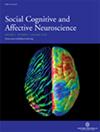对健康男性进行去甲肾上腺素能和糖皮质激素(联合)刺激后,三重网络参与没有变化
IF 3.1
2区 医学
Q2 NEUROSCIENCES
引用次数: 0
摘要
成功从压力中恢复是对环境做出适应性反应的必要条件。在细胞层面,这涉及皮质醇的(缓慢基因组)作用,它改变或逆转了与急性压力相关的去甲肾上腺素和皮质醇的快速效应。在网络层面,人们对压力恢复的了解较少,但认为它涉及显著性网络、执行控制网络和默认模式网络的变化。迄今为止,很少有研究对这一阶段进行调查并直接测试这些假设。在此,我们展示了一项双盲、安慰剂对照、组间范例研究(N = 165 名健康男性)的结果,研究人员在静息状态扫描前两小时口服了 10 毫克育亨宾和/或 10 毫克氢化可的松。我们发现,无论是单次用药还是联合用药,三个网络内部的连通性都没有发生变化。我们进一步报告了贝叶斯参数推断的结果,为零假设提供了证据。我们的研究结果与之前的研究结果形成了鲜明对比,这可能是由于不同范式之间的系统性差异造成的,突出了将特定范式效应与应激相关效应分离开来的必要性。本文章由计算机程序翻译,如有差异,请以英文原文为准。
No Changes in Triple Network Engagement Following (Combined) Noradrenergic and Glucocorticoid Stimulation in Healthy Men
Successful recovery from stress is integral for adaptive responding to the environment. At a cellular level, this involves (slow genomic) actions of cortisol, which alter or reverse rapid effects of noradrenaline and cortisol associated with acute stress. At the network scale, stress recovery is less well understood but assumed to involve changes within salience-, executive control-, and default mode networks. To date, few studies have investigated this phase and directly tested these assumptions. Here we present results from a double-blind, placebo-controlled, between-groups paradigm (N =165 healthy males) administering 10 mg oral yohimbine and/or 10 mg oral hydrocortisone two hours prior to resting state scanning. We found no changes in within network connectivity of the three networks, both after single and combined drug administration. We further report the results of Bayesian parameter inference to provide evidence for the null hypothesis. Our results contrast with previous findings, which may be attributable to systematic differences between paradigms, highlighting the need to isolate paradigm-specific effects from those related to stress.
求助全文
通过发布文献求助,成功后即可免费获取论文全文。
去求助
来源期刊
CiteScore
6.80
自引率
4.80%
发文量
62
审稿时长
4-8 weeks
期刊介绍:
SCAN will consider research that uses neuroimaging (fMRI, MRI, PET, EEG, MEG), neuropsychological patient studies, animal lesion studies, single-cell recording, pharmacological perturbation, and transcranial magnetic stimulation. SCAN will also consider submissions that examine the mediational role of neural processes in linking social phenomena to physiological, neuroendocrine, immunological, developmental, and genetic processes. Additionally, SCAN will publish papers that address issues of mental and physical health as they relate to social and affective processes (e.g., autism, anxiety disorders, depression, stress, effects of child rearing) as long as cognitive neuroscience methods are used.

 求助内容:
求助内容: 应助结果提醒方式:
应助结果提醒方式:


